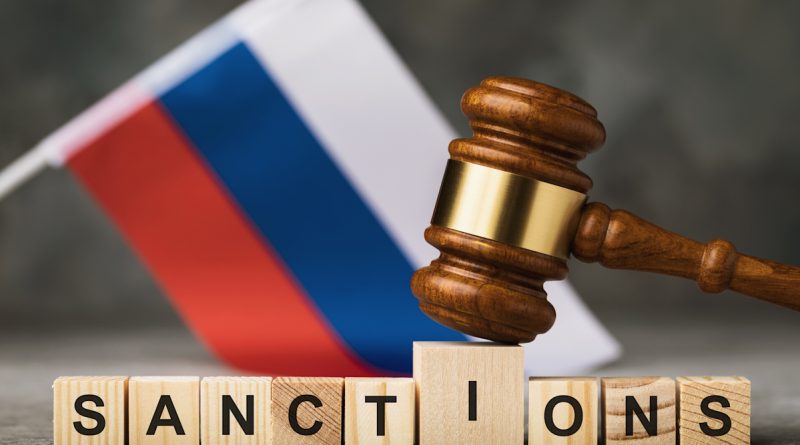How Bitcoin & Crypto Can Help Russia Avoid Sanctions
The United States and Europe have imposed financial sanctions on Russia. However, Moscow can get around them by using cryptocurrency. Let’s tell you how.
How Russia can use crypto to bypass sanctions
Countries around the world have put sanctions on Russia to isolate and punish Moscow after its invasion of Ukraine.
The US and Europe have already declared an unprecedented set of penalties against Russia. In fact, the business world is now targeting more than twenty figures along with Russian president, Vladimir Putin, and his minister of foreign affairs, Sergei Lavrov.
Additionally, in a more drastic move, the United States and Europe have declared the withdrawal of many Russian banks from the Swift system. It’s a network of financial institutions used by businesses around the world as a vital communication channel.
However, many are already thinking that Vladimir Putin’s nation could use cryptocurrency to avoid this problem. And there’s no doubt that a crypto is a great option for him to get around this exclusion from the traditional global financial system.
However, for this young industry, this would be an unseen situation.
What do the before and after situations look like for crypto?
Dissidents, protest movements, and communities in nations at war or experiencing an economic crisis with often depreciated currencies have looked toward cryptocurrency. However, a state that is a great power has truly never used it on such a wide scale.
Chris Kline, chief operating officer and co-founder of cryptocurrency investing business Bitcoin Ira, argues that “this is an uncharted ground.”
Just a few weeks ago we received two different communications from Russia. One was legislation from the central bank that was against bitcoin and cryptocurrency. Meanwhile, the other was legislation from their parliament that said that, in fact, cryptocurrency might have some use.
The statements struck a chord with Michael Fasanello as well. He is the director of training and regulatory relations at Blockchain Intelligence Group.
Putin was politically opposed to their prohibition on cryptocurrencies. Also, he added, he wanted cryptocurrency to be a part of Russian mainstream finance or at the very least an alternative to it.
He makes the observation that Russia might find a way around the sanctions.
“Russia is able to essentially defy global sanctions,” he said.
What makes crypto an alternative for Russia?
Traditionally, countries could invoke sanctions using financial tools like bank account freeze.
However, the cryptocurrency sector is a decentralized sector. Therefore, there isn’t a central authority or regulator. So you can’t outlaw cryptocurrencies. So, it is possible to limit its use by outlawing or controlling cryptocurrency exchanges.
Now, it’s reasonable to state that all options regarding what Russia will do in the case of severe financial sanctions are on the table with crypto.
Does Russia have a cryptocurrency stockpile?
According to Nick Donarski, “Russia has used cryptocurrency since the start and the first usage of crypto.” Nick is a cybersecurity specialist and the CEO of ORE Sys LLC.
So, even in the scenario where they’re talking about barring Russia from the SWIFT system to lessen their ability to effectively transfer payments between country states, they already have a reserve of crypto assets. In fact, they’ve stocked this asset over the previous years, according to the analyst.
As a result, the exclusion of Russia from SWIFT “would not entirely restrict their ability to function, to pay, and to transfer payments.
Donarski continued, “When I first started buying bitcoin at a price of $16 a coin, Russia began to receive it. Since then, however, the price per coin has increased as the currency has grown in popularity, adoption, and user base. As a result, the value of [their] crypto holdings has probably increased immediately.
What crypto use can Russia make?
On exchange platforms, selling cryptocurrency is one of the most popular methods. Some exchanges adhere strictly to rules and laws. However, others do not. Besides, peer-to-peer trades are another way that people sell their cryptocurrency holdings.
According to cybersecurity experts consulted by TheStreet, Russia has a variety of options for using its cryptocurrency stock.
It might enter the non-fungible token (NFT) market. There some digital collectibles fetch millions of dollars and trade for fiat money.
So, by conducting business with other friendly nations, Moscow could potentially manipulate the system and get past the sanctions.
Fasanello explains, “since we’re going to crack down on their banks, Russia might not be able to use the conventional financial system. We might even disconnect them from Swift, the Society for Worldwide Interbank Fund Transfers, in the future.”
“Their entire financial system will be substantially shut off if we do that. If that occurs, Venezuela can make payments to Russia in bitcoin if they want to do business with Russia. They can use a variety of different addresses and methods. Moreover, they can stagger the payments, and otherwise make them appear less significant. And the United States can do little to change that.”
Fasanello further claims that even buying a lot of weapons on the dark web would be simpler for a big nation like Russia.
“I mean, I can go to the dark web, pay with cryptocurrency, and buy various items of that nature. For example, incendiaries and rocket-propelled grenades. These materials are just awash in the dark web. We’ve repeatedly observed that child pornography, illegal firearms, drugs, and other items are all available on the dark web and one can easily buy those using cryptocurrencies.”
Moreover, one benefit of cryptocurrencies is that they are rapid, borderless, and weightless.
How can Russia transport billions in crypto?
Moscow has access to a sophisticated technique known as “peels.” This entails using hundreds of transactions to obfuscate the flow of money.
In fact, you can take a lot of cash and move it from one wallet address to another. Then you do many transactions to make the trail more difficult to follow. People are more likely to become exhausted and give up looking for the trail the more transactions they carry out. Read more here about wallets.
This is popular as blockchain hopping in the cryptocurrency realm. Here it will switch between the blockchains for Litecoin, Ethereum, and Bitcoin.
How does it work?
According to Fasanello, there is also “address hopping within a blockchain from one bitcoin address to another bitcoin address and so on.” This might further complicate things.
“And you can peel off little bits of this money as you move along these hops. Let’s pretend you have $20 billion worth of bitcoin. Through transaction after transaction after transaction, you can take small pieces of that $20 billion. It sort of grows smaller and smaller as you move that money around the blockchain, but not by enough that one can notice it.
For example, you wouldn’t go from $20 billion to $1 billion. That would be very obvious and would actually have an impact on the market’s liquidity. Russia wouldn’t want to be creating waves like that, Fasanello continued.
However, according to Donarski, it is still possible to identify the source of a cryptocurrency. Yet, he notes that the cryptocurrency exchange platforms lack the equipment required to carry out what would seem to be Herculean work.
“The KYC (Know Your Customer) due diligence doesn’t go that far. They don’t conduct an in-depth investigation into the source of the funds. So in essence, Russia may send bitcoin through a variety of means to someone who trades it on” a cryptocurrency trading site.
Could the US and EU stop Russia from using cryptocurrency?
Can the US and EU ever effectively stop Russia from using cryptocurrencies? No, can they make it more challenging by, say, controlling the off-channels and off-ramps where they can sell their cryptocurrency? Yes. Fasanello, whose business provides its clients with a tool to detect questionable transactions, Blockchain Analysis, explains how.
The ideal course of action, according to Fasanello, would be for the United States and their European allies to establish formal laws for the country’s market players. Moreover, they would do so to reach agreements with other nations that will do the same.
For example, we could tell cryptocurrency exchanges to refuse transactions from specific Russian people or organizations. Also, we could urge them to block any transaction linked to those people or organizations.
Even though transactions in cryptocurrency are completely anonymous, the transactions don’t associate any names. You only see the recipient addresses from which the sender has transferred the money. Or you see the wallet address from which the receiver has received it, together with the date, time, and value transfer. There is no personal data such as a street address, phone number, or social security number included.
However, some software makes it possible to tag transactions. They allow users of those applications to get a more complete picture of the blockchain’s operations.
Would using crypto to bypass sanctions affect the market?
Donarski cautions, “If you see a big nation-state get on bitcoin, it truly solidifies everything that people have been saying about cryptocurrency. It is exclusive for the bad guys.” “This will negatively impact bitcoin itself. It will become less valuable.”




